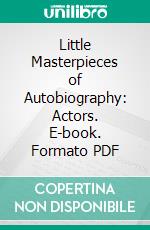George Iles eBooks
eBooks di George Iles
Leading American Inventors. E-book. Formato PDF George Iles - Forgotten Books, 2017 -
Within its twelve chapters this book presents a group of leading American inventors of the past. First in time, and, in many respects, first in talent, is Colonel John Stevens, who built a successful screw propeller, and who devised a sectional boiler of a model which, duly modified, is in wide use to-day. Beside him stands his son Robert, who devised the T-rail and much other equipment for railroads and workshops. Fulton comes next with his Clermont and his torpedoes, an inventor with a statesman's breadth of mind, with the outlook of an artist no less than that of an engineer. The mastery of land and sea is continued by Ericsson with his Novelty locomotive, his Monitor, and his caloric engine. These four great engineers are succeeded by four mechanics, each the leader of an industrial revolution. First Whitney, with his cotton-gin; then Blanchard, with his copying lathe; McCormick, with his reaper; Howe, with his sewing-machine. Then, all alone, stands Charles Goodyear, who came to the vulcanization of rubber by dint of a courage unsurpassed in the annals of peace or war. A final quartette are inventors who broadened the empire of the printed word: Morse, who gave electricity a pencil to write its messages a thousand miles away; Tilghman, who derived paper from wood so as to create a new basic industry for mankind; Sholes, who built a typewriter to replace the pen with the legibility and swiftness of printing; and last of all, Mergenthaler, who took a Sholes keyboard, and bade it compose both the columns of newspapers and the pages of a book.The sketches of these heroes and their exploits include much information never published before.
Little Masterpieces of Autobiography: Actors. E-book. Formato PDF George Iles - Ionlineshopping.Com, 2019 -
A good play gives us in miniature a cross-section of life, heightened by plot and characterisation, by witty and compact dialogue. Of course we should honour first the playwright, who has given form to each well knit act and telling scene. But that worthy man, perhaps at this moment sipping his coffee at the Authors' Club, gave his drama its form only; its substance is created by the men and women who, with sympathy, intelligence and grace, embody with convincing power the hero and heroine, assassin and accomplice, lover and jilt. For the success of many a play their writers would be quick to acknowledge a further and initial debt, both in suggestion and criticism, to the artists who know from experience on the boards that deeds should he done, not talked about, that action is cardinal, with no other words than naturally spring from action. Players, too, not seldom remind authors that every incident should not only be interesting in itself, but take the play a stride forward through the entanglement and unravelling of its plot. It is altogether probable that the heights to which Shakespeare rose as a dramatist were due in a measure to his knowledge of how a comedy, or a tragedy, appears behind as well as in front of the footlights, all in an atmosphere quite other than that surrounding a poet at his desk. This little volume begins with part of the life story of Joseph Jefferson, chief of American comedians. Then we are privileged to read a few personal letters from Edwin Booth, the acknowledged king of the tragic stage. He is followed by the queen in the same dramatic realm, Charlotte Cushman. Next are two chapters by the first emotional actress of her day in America, Clara Morris. When she bows her adieu, Sir Henry Irving comes upon the platform instead of the stage, and in the course of his thoughtful discourse makes it plain how he won renown both as an actor and a manager. He is followed by his son, Mr. Henry Brodribb Irving, clearly an heir to his father's talents in art and in observation. Miss Ellen Terry, long Sir Henry Irving's leading lady, now tells us how she came to join his company, and what she thinks of Sir Henry Irving in his principal roles. The succeeding word comes from Richard Mansfield, whose untimely death is mourned by every lover of the drama. The next pages are from the hand of Tommaso Salvini, admittedly the greatest Othello and Samson that ever trod the boards. A few words, in closing, are from Adelaide Ristori, whose Medea, Myrrha and Phaedra are among the great traditions of the modern stage. From first to last this little book sheds light on the severe toil demanded for excellence on the stage, and reveals that for the highest success of a drama, author and artist must work hand in hand. Contents Joseph Jefferson -- Edwin Booth -- Charlotte Cushman -- Clara Morris -- Sir Henry Irving -- Henry Brodribb Irving -- Ellen Terry -- Richard Mansfield -- Tommaso Salvini -- Adelaide Ristori.

